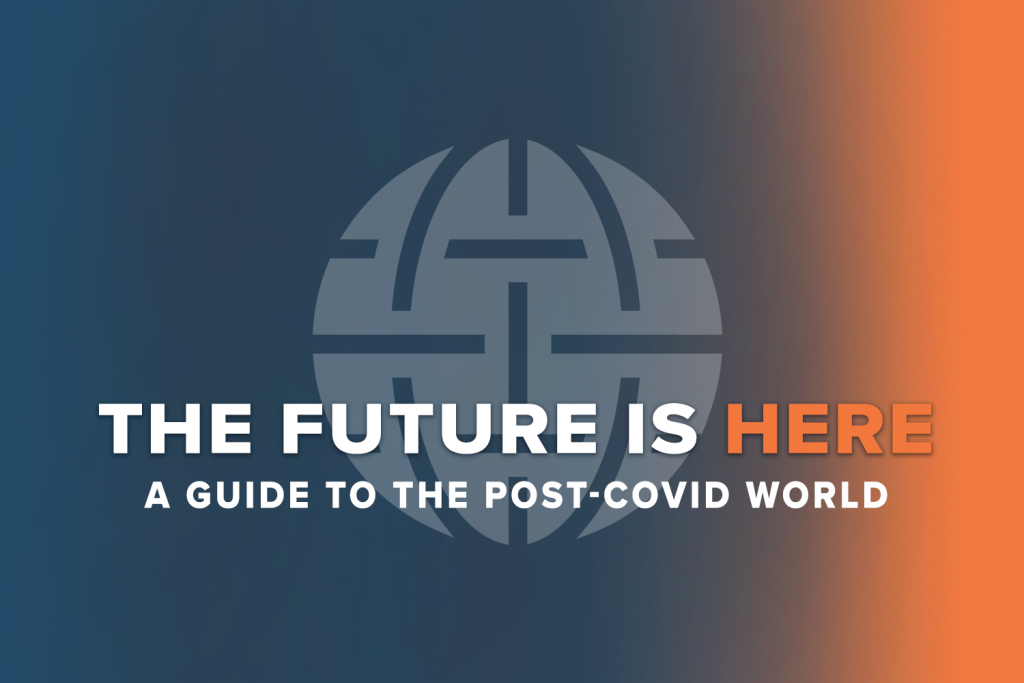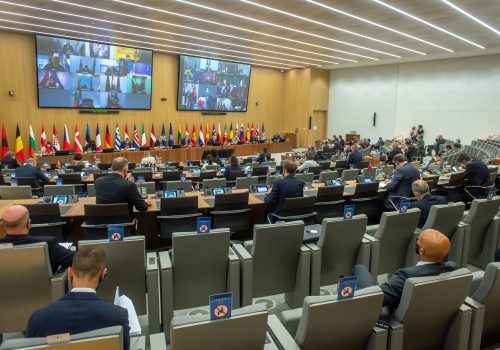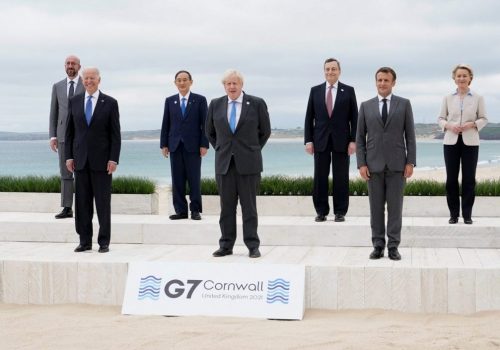The future is here: A guide to the post-COVID world 06/18/2021
Welcome to your guide to where the world is headed during the pandemic era and beyond, from Andrew Marshall. Each week, we’ll bring you the latest and most significant expert insights and international news about how coronavirus is reshaping international affairs. To stay updated each week, sign up to the newsletter here.
Let’s take a spin around the globe, in seven minutes or less.
In top stories this week:
- The G7’s plans to overcome COVID-19 together.
- Why a “variant of concern” is throwing a wrench in UK plans.
- But first…
The big story
This week’s key theme: Africa is hitting its third COVID-19 wave—and alarm bells should be ringing.
The headlines after last weekend’s meeting of the Group of Seven (G7) featured the big names of global politics: Biden, Macron, Johnson, and more.
But the man who should have got the headlines was South African President Cyril Ramaphosa. He traveled to England to argue the case for his country and for Africa, and that case really deserves a hearing.
“We need to address the substantial financing gap for tests, treatments, critical supplies like oxygen, and the health systems that enable testing, treatment, and vaccination,” Ramaphosa said. “If the world is to emerge from this grave crisis, it is essential that we work together to mobilize and direct resources to those countries in the greatest need—and that we do so now.”
I am focused on COVID-19 in Africa this week. Zakiya, a friend and former colleague from South Africa, died of COVID-19 this week. Many of us have lost friends or family in the pandemic. This one hit home. Zakiya was in her thirties and was vibrant, clever, challenging, and funny. I last saw her in 2017 when she visited the United States as a Mandela Washington Fellow; she brought my daughter a T-shirt with a picture of anti-apartheid leader Steve Biko. I had hoped we might meet again in South Africa, but now that is not to be.
A surge of coronavirus infections is hitting Africa. It hasn’t hit the headlines in the same way as the crisis in India, but it is just as real a problem. The underlying issues—lack of international cooperation over vaccines and weak health systems —are clear.
Just over a week ago, World Health Organization (WHO) Regional Director for Africa Matshidiso Moeti warned “the threat of a third wave in Africa is real and rising.” By this Tuesday, Ramaphosa had announced new lockdown measures and a curfew. “A third wave of infections is upon us,” he said.
The spread is also happening in Uganda, Namibia, Zambia, and the Democratic Republic of the Congo. “Uganda is of particular concern, recording a 131% week-on-week rise in cases, with isolation centres and intensive care units under strain,” reported the BBC. The Guardian, meanwhile, noted that “Uganda has all but run out of Covid-19 vaccines and oxygen as the country grapples with another wave of the pandemic.” In 2019, there were reported to be fifty-five functional ICU beds (although perhaps nearly one hundred depending on methodology) in Uganda; Washington, DC, alone has 345.
About 90 percent of African countries were already set to miss a September target to vaccinate 10 percent of their populations. “In Kenya, one of Africa’s biggest economies, with more than 50 million people, only 1,386 have received two doses of a vaccine,” said the New York Times. That’s about the average population of one block of Manhattan. As of last week, five African countries still had not administered any vaccine shots at all. The rollout has been hampered by vaccine hesitancy, as in the West, but that’s only part of the challenge.
The flow of vaccines to the continent has almost dried up. “The international scheme to ensure equal access to Covid-19 vaccines is 140 million doses short because of India’s continuing Covid crisis,” the BBC reported last month. It explained that the Serum Institute of India, the largest supplier to the COVAX Facility, had made none of its planned shipments after India suspended exports of vaccines in March as India was itself facing a crisis.
In South Africa, which hosts the African continent’s largest COVID-19 caseload, just 0.8 percent of the population is fully vaccinated, the Associated Press (AP) reported, citing a tracker by Johns Hopkins University. “And hundreds of thousands of the country’s health workers, many of whom come face-to-face with the virus every day,” AP adds, “are still waiting for their shots.” The country has discarded two million Johnson & Johnson vaccine doses which were found by the US Food and Drug Administration to be possibly contaminated at a Baltimore plant. The country also had problems with the AstraZeneca vaccine earlier this year.
The short- and long-term consequences of this for Africa are desperate. “Unvaccinated and without the help of large government stimulus measures, the continent’s middle class, a key engine of economic, educational and political development, is contracting rapidly,” says the Wall Street Journal, citing the Pew Research Center.
G7 leaders have promised to donate one billion doses of vaccines for the rest of the world. “This is a big help, but we need more, and we need them faster. Right now, the virus is moving faster than the global distribution of vaccines,” said WHO chief Tedros Adhanom Ghebreyesus.
The pandemic has been a test of medical ingenuity, political ability, and international solidarity. South Africa and its neighbors will need all three in the coming weeks.
Subscribe to The future is here: A guide to the post-COVID world
Sign up for a weekly roundup of top expert insights and international news about how coronavirus is reshaping international affairs.

The world in brief
Insights from across the planet, in ten bullets or fewer
- The United Kingdom has postponed its full reopening. After anguished deliberations, Prime Minister Boris Johnson shifted the date from June 21 to July 19. “The PM said it was a ‘very difficult choice’ but it was ‘sensible’ to wait a little longer,” the BBC reports. A version of COVID-19 which first appeared in India is now spreading rapidly. “The Delta variant is rising across the UK, where it now makes up more than 90% of new coronavirus [infections],” reports the Guardian.
- The US Centers for Disease Control and Prevention has labeled the Delta variant of COVID-19 a “variant of concern.” This designation “is given to strains of the virus that scientists believe are more transmissible or can cause more severe disease,” explains CNN. It accounts for about 6 percent of all coronavirus infections in the United States. “The bad news: Delta, a scary new variant of the coronavirus, is spreading both stateside and abroad,” says the Atlantic. “The good news: In the matchup between vaccines and variants, the vaccines remain ahead for now.”
- California has removed its restrictions. “Just in time for summer, California wants to send the message that life in the Golden State is getting much closer to normal,” AP reports. “The economy is fully reopening for the first time in 15 months and people can largely return to pre-pandemic lifestyles. Fans can cheer mask-less at Dodgers and Giants games. Disneyland is throwing its doors open to all tourists after allowing just California residents. People can pack indoor bars and nightclubs from the Sunset Strip in Los Angeles to the Castro in San Francisco.” What could be more American?
- Your holiday gifts may well be pandemic books. We have had data trackers for the virus and vaccinations, and the next one needed is probably for volumes: the number of pandemic books is rising to a concerning level. Dan Diamond and Alexandra Ellerbeck review some in the Washington Post and also look at the wave of blame and counter-blame in those which track the Trump administration’s response. The books include “an entire cottage industry about Anthony S. Fauci, ranging from a children’s picture book to ‘Faucian Bargain,’ a conspiratorial tome taking aim at the government’s top infectious-disease expert.” I’ll wait for the movie.
The inside scoop
Insights from the Atlantic Council
Andrew Marshall is the Vice President of Communications for the Atlantic Council. He leads the Council’s media, digital, and editorial efforts, and coordinates the way the Council talks with its key communities.


